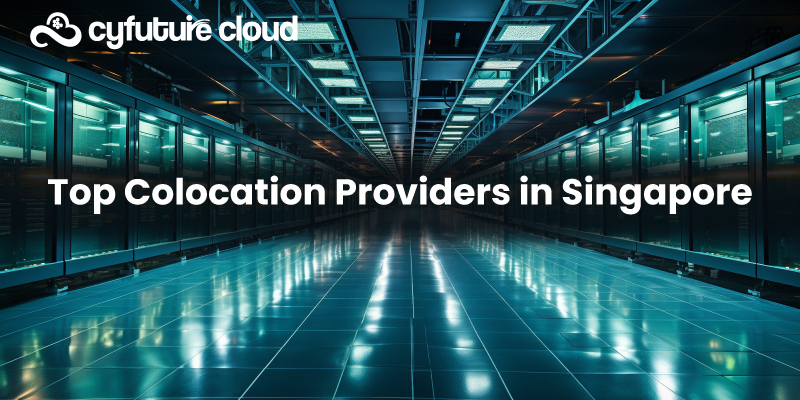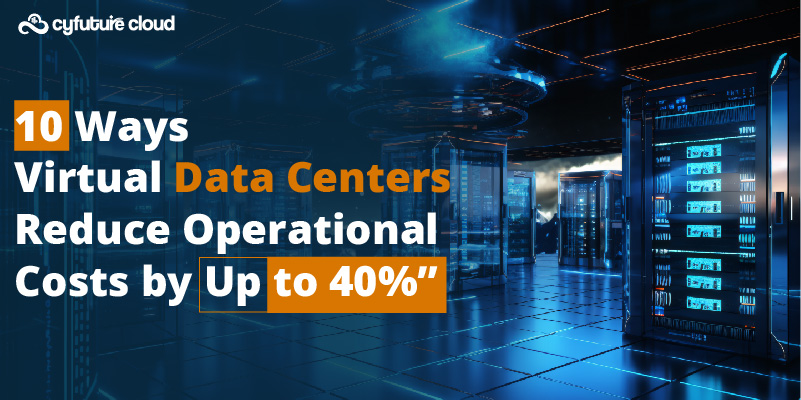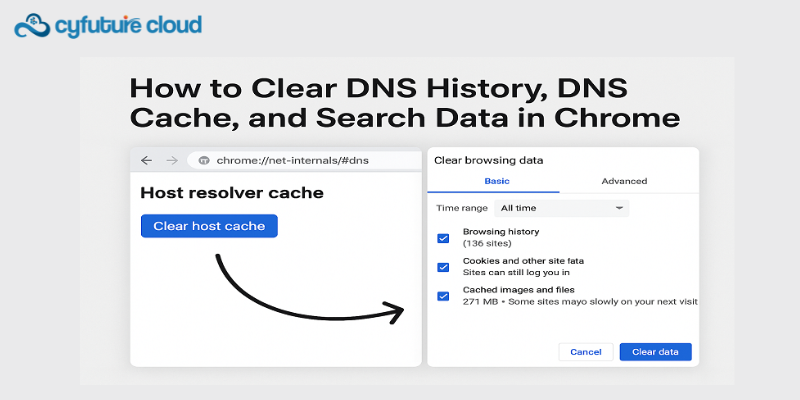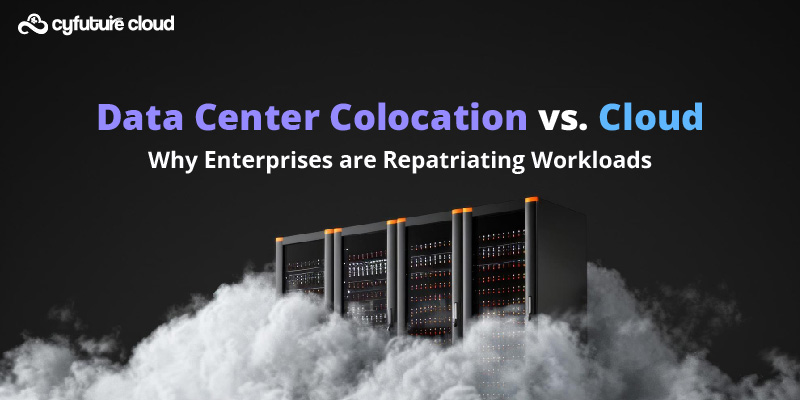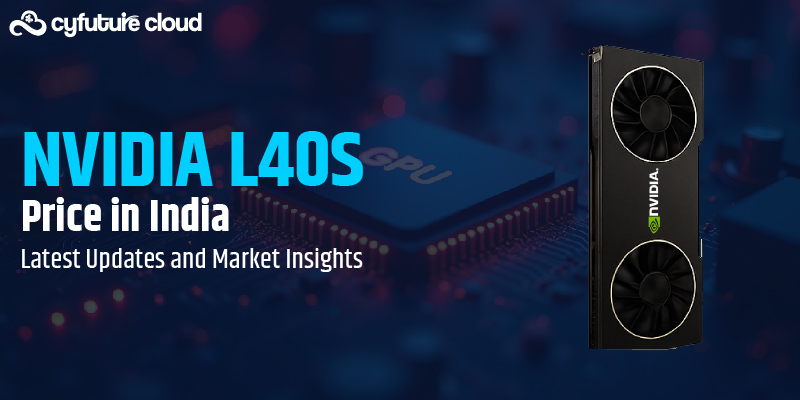Get 69% Off on Cloud Hosting : Claim Your Offer Now!
- Products
-
Compute
Compute
- Predefined TemplatesChoose from a library of predefined templates to deploy virtual machines!
- Custom TemplatesUse Cyfuture Cloud custom templates to create new VMs in a cloud computing environment
- Spot Machines/ Machines on Flex ModelAffordable compute instances suitable for batch jobs and fault-tolerant workloads.
- Shielded ComputingProtect enterprise workloads from threats like remote attacks, privilege escalation, and malicious insiders with Shielded Computing
- GPU CloudGet access to graphics processing units (GPUs) through a Cyfuture cloud infrastructure
- vAppsHost applications and services, or create a test or development environment with Cyfuture Cloud vApps, powered by VMware
- Serverless ComputingNo need to worry about provisioning or managing servers, switch to Serverless Computing with Cyfuture Cloud
- HPCHigh-Performance Computing
- BaremetalBare metal refers to a type of cloud computing service that provides access to dedicated physical servers, rather than virtualized servers.
-
Storage
Storage
- Standard StorageGet access to low-latency access to data and a high level of reliability with Cyfuture Cloud standard storage service
- Nearline StorageStore data at a lower cost without compromising on the level of availability with Nearline
- Coldline StorageStore infrequently used data at low cost with Cyfuture Cloud coldline storage
- Archival StorageStore data in a long-term, durable manner with Cyfuture Cloud archival storage service
-
Database
Database
- MS SQLStore and manage a wide range of applications with Cyfuture Cloud MS SQL
- MariaDBStore and manage data with the cloud with enhanced speed and reliability
- MongoDBNow, store and manage large amounts of data in the cloud with Cyfuture Cloud MongoDB
- Redis CacheStore and retrieve large amounts of data quickly with Cyfuture Cloud Redis Cache
-
Automation
Automation
-
Containers
Containers
- KubernetesNow deploy and manage your applications more efficiently and effectively with the Cyfuture Cloud Kubernetes service
- MicroservicesDesign a cloud application that is multilingual, easily scalable, easy to maintain and deploy, highly available, and minimizes failures using Cyfuture Cloud microservices
-
Operations
Operations
- Real-time Monitoring & Logging ServicesMonitor & track the performance of your applications with real-time monitoring & logging services offered by Cyfuture Cloud
- Infra-maintenance & OptimizationEnsure that your organization is functioning properly with Cyfuture Cloud
- Application Performance ServiceOptimize the performance of your applications over cloud with us
- Database Performance ServiceOptimize the performance of databases over the cloud with us
- Security Managed ServiceProtect your systems and data from security threats with us!
- Back-up As a ServiceStore and manage backups of data in the cloud with Cyfuture Cloud Backup as a Service
- Data Back-up & RestoreStore and manage backups of your data in the cloud with us
- Remote Back-upStore and manage backups in the cloud with remote backup service with Cyfuture Cloud
- Disaster RecoveryStore copies of your data and applications in the cloud and use them to recover in the event of a disaster with the disaster recovery service offered by us
-
Networking
Networking
- Load BalancerEnsure that applications deployed across cloud environments are available, secure, and responsive with an easy, modern approach to load balancing
- Virtual Data CenterNo need to build and maintain a physical data center. It’s time for the virtual data center
- Private LinkPrivate Link is a service offered by Cyfuture Cloud that enables businesses to securely connect their on-premises network to Cyfuture Cloud's network over a private network connection
- Private CircuitGain a high level of security and privacy with private circuits
- VPN GatewaySecurely connect your on-premises network to our network over the internet with VPN Gateway
- CDNGet high availability and performance by distributing the service spatially relative to end users with CDN
-
Media
-
Analytics
Analytics
-
Security
Security
-
Network Firewall
- DNATTranslate destination IP address when connecting from public IP address to a private IP address with DNAT
- SNATWith SNAT, allow traffic from a private network to go to the internet
- WAFProtect your applications from any malicious activity with Cyfuture Cloud WAF service
- DDoSSave your organization from DoSS attacks with Cyfuture Cloud
- IPS/ IDSMonitor and prevent your cloud-based network & infrastructure with IPS/ IDS service by Cyfuture Cloud
- Anti-Virus & Anti-MalwareProtect your cloud-based network & infrastructure with antivirus and antimalware services by Cyfuture Cloud
- Threat EmulationTest the effectiveness of cloud security system with Cyfuture Cloud threat emulation service
- SIEM & SOARMonitor and respond to security threats with SIEM & SOAR services offered by Cyfuture Cloud
- Multi-Factor AuthenticationNow provide an additional layer of security to prevent unauthorized users from accessing your cloud account, even when the password has been stolen!
- SSLSecure data transmission over web browsers with SSL service offered by Cyfuture Cloud
- Threat Detection/ Zero DayThreat detection and zero-day protection are security features that are offered by Cyfuture Cloud as a part of its security offerings
- Vulnerability AssesmentIdentify and analyze vulnerabilities and weaknesses with the Vulnerability Assessment service offered by Cyfuture Cloud
- Penetration TestingIdentify and analyze vulnerabilities and weaknesses with the Penetration Testing service offered by Cyfuture Cloud
- Cloud Key ManagementSecure storage, management, and use of cryptographic keys within a cloud environment with Cloud Key Management
- Cloud Security Posture Management serviceWith Cyfuture Cloud, you get continuous cloud security improvements and adaptations to reduce the chances of successful attacks
- Managed HSMProtect sensitive data and meet regulatory requirements for secure data storage and processing.
- Zero TrustEnsure complete security of network connections and devices over the cloud with Zero Trust Service
- IdentityManage and control access to their network resources and applications for your business with Identity service by Cyfuture Cloud
-
-
Compute
- Solutions
-
Solutions
Solutions
-
 Cloud
Hosting
Cloud
Hosting
-
 VPS
Hosting
VPS
Hosting
-
GPU Cloud
-
 Dedicated
Server
Dedicated
Server
-
 Server
Colocation
Server
Colocation
-
 Backup as a Service
Backup as a Service
-
 CDN
Network
CDN
Network
-
 Window
Cloud Hosting
Window
Cloud Hosting
-
 Linux
Cloud Hosting
Linux
Cloud Hosting
-
Managed Cloud Service
-
Storage as a Service
-
 VMware
Public Cloud
VMware
Public Cloud
-
 Multi-Cloud
Hosting
Multi-Cloud
Hosting
-
 Cloud
Server Hosting
Cloud
Server Hosting
-
 Bare
Metal Server
Bare
Metal Server
-
 Virtual
Machine
Virtual
Machine
-
 Magento
Hosting
Magento
Hosting
-
Remote Backup
-
 DevOps
DevOps
-
 Kubernetes
Kubernetes
-
 Cloud
Storage
Cloud
Storage
-
NVMe Hosting
-
 DR
as s Service
DR
as s Service
-
-
Solutions
- Marketplace
- Pricing
- Resources
- Resources
-
By Product
Use Cases
-
By Industry
- Company
-
Company
Company
-
Company
AI Data Center: The Backbone of the Digital Revolution
Table of Contents
Artificial Intelligence (AI) data centers—a rapidly emerging trend—are critical to powering the modern digital ecosystem. Although the term has gained significant traction recently, its deeper intricacies remain underexplored. AI data centers are revolutionizing industries by delivering the infrastructure required for complex computations, machine learning tasks, and vast data processing.
In this blog, we’ll explore what an AI data center is, its unique features, how it differs from traditional data centers, and its growing importance in the tech landscape. Let’s get started!
What Is an AI Data Center?
An AI data center is a facility designed and optimized specifically for supporting artificial intelligence workloads. Unlike traditional data centers that primarily handle general-purpose cloud computing and storage, AI data centers focus on high-performance computing (HPC) needs. These include running machine learning algorithms, training large language models, supporting neural networks, and processing massive datasets in real time.
At their core, AI data centers are powered by advanced hardware such as GPUs (Graphics Processing Units), TPUs (Tensor P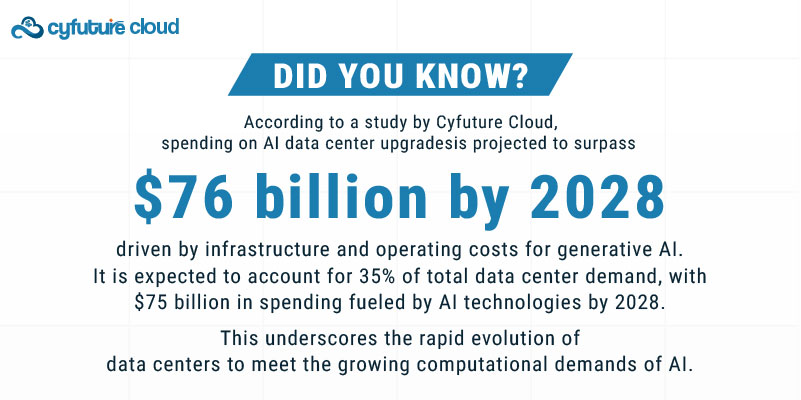 rocessing Units), and FPGA (Field Programmable Gate Arrays), along with specialized software and frameworks that optimize AI workflows.
rocessing Units), and FPGA (Field Programmable Gate Arrays), along with specialized software and frameworks that optimize AI workflows.
Key Features of AI Data Centers
AI-Optimized Hardware
AI workloads demand immense processing power. AI-powered data centers leverage specialized processors like GPUs and TPUs to handle parallel computations efficiently. These processors outperform traditional CPUs for deep learning model training and inference tasks.
High-Performance Storage
AI applications generate and consume vast amounts of data. AI data centers have cutting-edge storage solutions like NVMe SSDs to ensure rapid data access and low latency.
Enhanced Networking
AI data centers deploy high-speed networking infrastructure, such as 100Gbps Ethernet or InfiniBand technologies, to facilitate seamless data transfer between servers.
Scalability
AI workloads often experience sudden spikes in demand. AI-powered data centers are designed with scalability, allowing resources to be dynamically allocated as needed.
Energy Efficiency
AI operations consume significant energy. Many AI data center companies are adopting innovative cooling solutions, such as liquid cooling and AI-driven energy management, to minimize carbon footprints.
How Do AI Data Centers Differ from Traditional Data Centers?
|
Feature |
Traditional Data Centers |
AI-Powered Data Centers |
|
Purpose |
General-purpose IT workloads |
AI-specific computations and large-scale data processing |
|
Hardware |
Standard CPUs and storage |
GPUs, TPUs, high-speed storage |
|
Networking |
Standard Ethernet |
High-speed, low-latency networking |
|
Scalability |
Limited scalability |
High scalability for dynamic AI demands |
|
Energy Usage |
Moderate |
Higher, with advanced cooling systems |
Applications of AI Data Centers
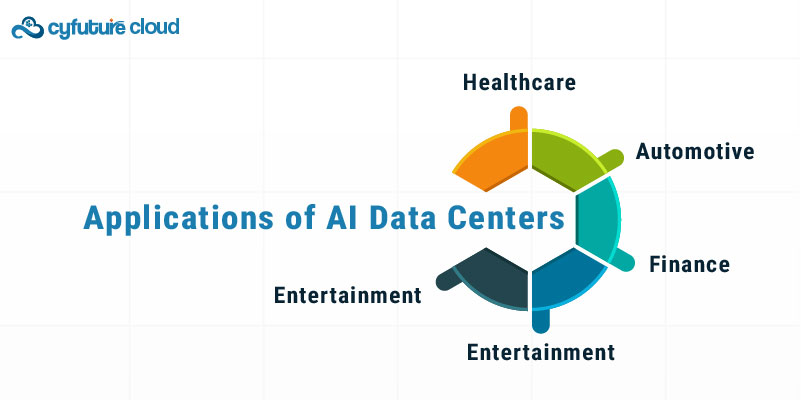
The impact of AI data centers extends across multiple industries, enabling groundbreaking innovations:
Healthcare
AI data centers process vast medical datasets, aiding in disease diagnosis, drug discovery, and personalized treatments.
Automotive
Autonomous vehicles rely on AI data centers to train algorithms for image recognition, sensor data processing, and navigation.
Finance
AI-driven computational capabilities power high-frequency trading, fraud detection, and credit risk modeling.
Entertainment
From rendering ultra-high-definition video to creating immersive AR/VR experiences, AI data centers play a pivotal role.
Retail and E-commerce
Businesses leverage AI-powered insights for inventory optimization, personalized recommendations, and customer analytics.
What Are AI-Powered Data Centers?
An AI-powered data center refers to a facility that uses AI to manage and optimize its own operations. This includes:
- Energy Management: AI predicts energy demand and allocates power efficiently, reducing waste.
- Predictive Maintenance: AI algorithms analyze hardware performance data to identify potential failures before they occur.
- Dynamic Resource Allocation: AI dynamically adjusts resources to match workload demands, ensuring optimal performance.
- Enhanced Security: AI monitors for unusual activity patterns, preventing real-time cyber threats.
Integrating AI into data center operations enhances performance and reduces operational costs and environmental impact.
The Future of AI Data Centers
The demand for AI data centers is poised to grow exponentially as artificial intelligence continues to penetrate every aspect of business and daily life. Key trends shaping the future include:
Edge AI
AI data centers are expected to extend to edge computing facilities, enabling faster processing and reduced latency for applications like IoT and autonomous vehicles.
Green Data Centers
Sustainability will remain a top priority. Expect innovations in renewable energy integration, advanced cooling systems, and AI-driven efficiency improvements.
Hybrid Cloud Deployments
Businesses will increasingly adopt hybrid models that combine on-premises AI data centers with cloud-based solutions for flexibility and cost efficiency.
Quantum Computing
As quantum technologies mature, AI data centers may incorporate quantum processors to solve complex problems at unprecedented speeds.
Conclusion

AI data centers are no longer just a buzzword; they are the backbone of the AI revolution. Designed to handle the unique demands of artificial intelligence workloads, these facilities transform industries, enable innovation, and reshape how businesses operate.
From healthcare to retail, the applications of AI data centers are vast, and their importance continues to grow. Leading data center companies like Cyfuture Cloud are pioneering advancements that make AI more accessible and powerful than ever. At Cyfuture Cloud, we specialize in delivering cutting-edge AI-powered data center solutions tailored to meet the dynamic requirements of modern businesses. Our infrastructure supports high-performance computing, seamless scalability, and sustainable energy efficiency to empower organizations across industries.
Moreover, the emergence of AI-powered data centers drives operational efficiency and sustainability to new heights. As businesses increasingly embrace AI, the role of AI data centers will only expand. Investing in this cutting-edge infrastructure is no longer optional—staying competitive in the digital age is necessary. Whether you’re an enterprise looking to adopt AI or a professional exploring the future of computing, understanding the significance of AI data centers is a step toward harnessing the full potential of artificial intelligence.
Recent Post

Stay Ahead of the Curve.
Join the Cloud Movement, today!
© Cyfuture, All rights reserved.
Send this to a friend

 Pricing
Calculator
Pricing
Calculator
 Power
Power
 Utilities
Utilities VMware
Private Cloud
VMware
Private Cloud VMware
on AWS
VMware
on AWS VMware
on Azure
VMware
on Azure Service
Level Agreement
Service
Level Agreement 












